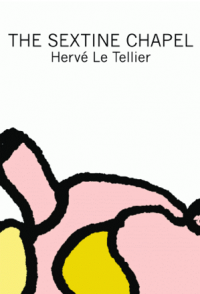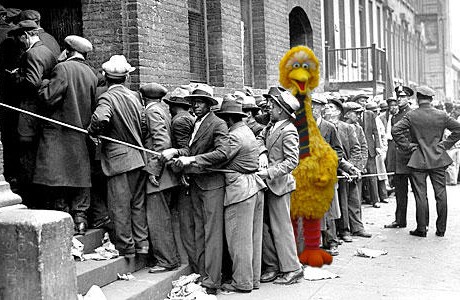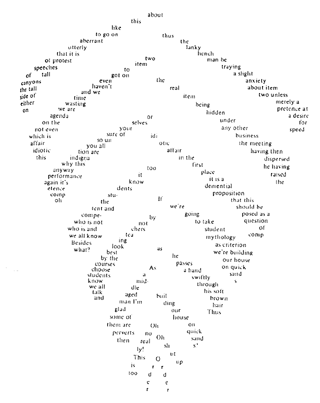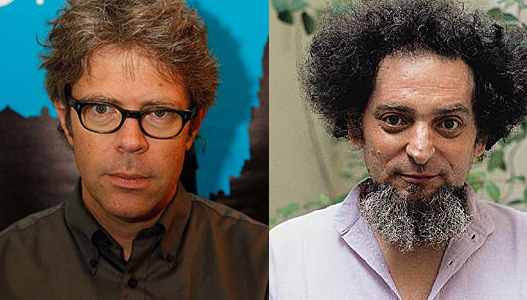What we talk about when we talk about the New Sincerity, part 2

"Hi, How Are You?" cover art by Daniel Johnston (1983); "financially desperate tree doing a 'quadruple kickflip' off a cliff into a 5000+ foot gorge to retain its nike, fritos, and redbull sponsorships " by Tao Lin (2010)
It made me very happy to read the various responses to Part 1, posted last Monday. Today I want to continue this brief digression into asking what, if anything, the New Sincerity was, as well as what, if anything, it currently is. (Next Monday I’ll return to reading Viktor Shklovsky’s Theory of Prose and applying it to contemporary writing.)
Last time I talked about 2005–8, but what was the New Sincerity before Massey/Robinson/Mister? (And does that matter?) Others have pointed out that something much like the movement can be traced back to David Foster Wallace’s 1993 Review of Contemporary Fiction essay “E Unibus Pluram: Television and U.S. Fiction” (here’s a PDF copy). I can recall conversations, 2000–3, with classmates at ISU (where DFW taught and a number of us worked for RCF/Dalkey) about “the death of irony” and “the death of Postmodernism” and a possible “return to sincerity.” Today, even the Wikipedia article on the NS also makes that connection:
Viktor Shklovsky wants to make you a better writer, part 1: device & defamiliarization
When I was finishing up my Master’s degree at ISU, I worried that I still didn’t know much about writing—like, how to actually do it. My mentor Curtis White told me, “Just read Viktor Shklovsky; it’s all in there.” So I moved to Thailand and spent the next two years poring over Theory of Prose. When I returned to the US in the summer of 2005, I sat down and started really writing.
I’ve already put up one post about what, specifically I learned from Theory of Prose, but it occurs to me now that I can be even more specific. So this will be the first in a series of posts in which I try to boil ToP down into a kind of “notes on craft,” as well as reiterate some of the more theoretical arguments that I’ve been making both here and at Big Other over the past 2+ years. Of course if this interests you, then I most fervently recommend that you actually read the Shklovsky—and not just ToP but his other critical texts as well as his fiction, which is marvelous. (Indeed, Curt has since told me that he didn’t mean for me to focus so much on ToP! But I still find it extraordinarily useful.)
Let’s talk first about where Viktor Shklovsky himself started: the concepts of device and defamiliarization.
R.I.P. Carlos Fuentes. I just found out. He was one of the greats. Places to start if you haven’t read him: Where the Air Is Clear (1958), The Death of Artemio Cruz (1962), Terra Nostra (1975). & here he is on the BBC (audio), and here are various YouTube videos.
Godspeed, good sir.
A Pan-English Dictionary (for readers of Harry Mathews’s The Sinking of the Odradek Stadium)
 And while on the subject of reposting literary resources: here’s a Pan-English dictionary I made for the benefit of anyone reading Harry Mathews‘s early masterpiece, the epistolary novel The Sinking of the Odradek Stadium.
And while on the subject of reposting literary resources: here’s a Pan-English dictionary I made for the benefit of anyone reading Harry Mathews‘s early masterpiece, the epistolary novel The Sinking of the Odradek Stadium.
Odradek presents the correspondence of newlyweds and amateur sleuths Zachary McCaltex and Twang Panattapam. Separated by the Atlantic, they exchange letters in which they “try to trace the whereabouts of a treasure supposedly lost off the coast of Florida in the sixteenth century, while navigating a relationship separated by an ocean as well as their different cultures.”
Twang, who hails “from the Southeast-Asian country of Pan-Nam,” peppers her letters with snatches of her native language, “Pan.” Fortunately for her husband and the reader, she also translates it on the spot. I’ve collected all of the Pan and its English equivalents and presented them below.
Wittgenstein’s Mistress: An Index
A while back, I published an index for Wittgenstein’s Mistress. Blake’s recent post about WM got me thinking that I should repost it here. Please feel free to copy/distribute it/whatever; my goal is to assist anyone reading or doing research on the book, which I think one of the two greatest novels of the past 25 years.
Notes:
- Be warned! I’m sure there are errors. (If you find any, please let me know, as well as any other revisions, comments, or suggestions.)
- Underlined entries are incomplete; underlined page numbers are uncertain. (If you can expand/confirm any of these in the comments, I’ll update the index, thanks!)
The Index
R.I.P. Christine Brooke-Rose
I just heard that Christine Brooke-Rose passed away.
I first came across her work thanks to Brian McHale’s Postmodernist Fiction (1987), where he wrote about her 1975 novel Thru.
At the time, I was deeply into concrete poetry, in particular novelists who used concrete poetry techniques (Kenneth Patchen, B.S. Johnson, Ann Quin). So I was hooked. I picked up the 1986 Christine Brooke-Rose Omnibus, which contains Thru as well as its three “companion” novels: Out (1964), Such (1966), and Between (1968). All of them are decidedly unusual; like Johnson and Quin, Brooke-Rose was heavily inspired by the French New Novel of Alain Robbe-Grillet, Marguerite Duras, and Nathalie Sarraute. (She translated Robbe-Grillet’s In the Labyrinth.) Like all of those authors, Brooke-Rose was a brilliant maker of contemporary fiction who deserves to be more widely read.
R.I.P. Jiří Gruša
He passed away today, in Germany. He was 72. I don’t know much about him. But I really enjoyed his novel The Questionnaire; Dalkey reprinted an English translation of it in 2000 and I read it upon arriving at ISU:
Originally circulated in Czechoslovakia in an underground edition of nineteen typewritten copies (which landed the author in jail for “initiating disorder”), The Questionnaire is Jirí Grusa’s internationally acclaimed masterpiece.
In completing a standard employment questionnaire, narrator Jan Kepka manages to write a beautifully impressionistic history of his life, his family, and his hometown as he obeys—with mock solemnity—the handwritten command on top of the form: “DO NOT CROSS OUT.”
Here’s a link to it at Google Books. And here’s an interview with him, conducted by my friend and former Dalkey workmate Ana Lucic. In that interview, Gruša mentions some of his other books, and that he planned to write a few more. I don’t know if he ever did. The other books, to my knowledge, haven’t been translated. But The Questionnaire, that’s a good one.
Godspeed, you Czech Emperor.
The Sextine Chapel
 The Sextine Chapel
The Sextine Chapel
by Hervé Le Tellier
Dalkey Archive Press, 2011
104 pages / $14.95 Buy from Dalkey Archive Press
Rating: 7.0
The Sextine Chapel, a book about the sexual interlocutions of 13 males and 13 females, stands upon the mathematical bedrock of Oulipo. The algorithm: (A)nna has sex with (B)en who has sex with (C)hloe who has sex with (D)ennis all the way until (Z)ach has sex with (A)nna who then skips six letters to (H)arry who skips another six to (O)riane and so on until, in close, (P)hilippe is having sex with (A)nna finishing the corporal turntable. Each hook-up is a paragraph on a page. Not everyone has sex with everyone else, but sayings are passed and settings repeated, creating a finite kaleidoscope of vagina and penis inside of which these strangers are connected.
August 30th, 2011 / 12:06 pm





